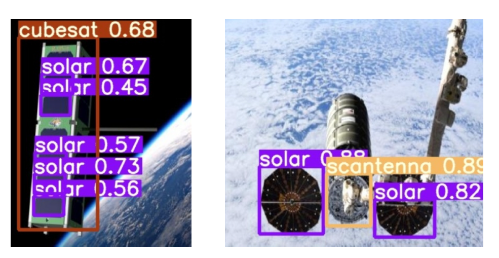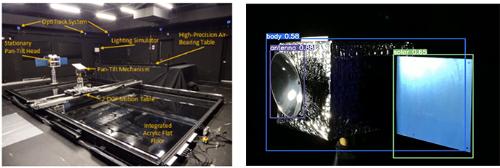

The NETS Lab ongoing projects are summarized below. Prospective research students are encouraged to reach out to Dr. White to discuss potential opportunities to get involved!
The NETS Lab collaborates with astronautical engineers to develop guidance and navigation capabilities for autonomous space vehicles to support proximity operations with non-cooperative resident space objects, such as orbiting satellites and space debris.
Deep learning for computer vision and in-orbit satellite component detection to support in-orbit servicing and space debris-capture missions.

We have implemented state-of-the-art object detection algorithms to automatically classify and localize objects like solar panels, antennas, cubesats, and satellite bodies and run tests in Florida Tech's ORION Research Lab.

Currently, we are tuning the models, developing best practices to deploy models on heavily limited computational resources characteristic of what can be implemented on small chaser satellites.
Learn more about a recent research presentation.
[Major parts of the efforts in this area have been supported by the U.S. Space Force and Air Force Research Lab.]
Novel Object Tracking Approach: To support the satellite project and beyond, we are developing novel object tracking algorithm that can run on edge hardware.
3D Pose Estimation: Another group is working on computer vision-based estimation of the 6-DOF pose (position and orientation) of an object in three dimension based on a camera feed. See some initial work on spacecraft pose estimation.
To learn more about this work, see the following publications:
We are studying how information flows through neural networks to devise novel loss functions, architectures, and training schemes to support computational efficiency as well as probabilistic analysis of internal data representations for explainable AI. Much of this work is funded by the U.S. Army Research and Development Center.
The NETS lab is involved in an NLP project to support automation of requirements engineering in the aerospace domain. This is a collaboration with researchers at Georgia Tech.
A. Tikayat Ray, A. P. Bhat, R. T. White, V. M. Nguyen, O. J. Pinon Fischer, and D. N. Mavris (2023). Examining the Potential of Generative Language Models for Aviation Safety Analysis: Case Study and Insights Using the Aviation Safety Reporting System (ASRS). Aerospace 2023, 10, 770. https://doi.org/10.3390/aerospace10090770
A. Tikayat Ray, B. F. Cole, O. J. Pinon Fischer, A. P. Bhat, R. T. White, and D. N. Mavris (2023). Agile Methodology for the Standardization of Engineering Requirements Using Large Language Models. Systems 2023, 11, 352. https://doi.org/10.3390/systems11070352
Hemodynamics: The NETS Lab is collaborating with the Mulitscale Cardiovascular Fluids Laboratory to develop neural networks that learn to predict fluid flow patterns in aneurysms. This involves physics-informed neural networks (PINNs) that learn to produce results at a tiny fraction of the time of computational fluid dynamics (CFD) simulations.
Synthetic Electronic Health Records: A project aims to generate realistic synthetic health data to support researchers, protect privacy, ensure compliance, and accelerate medical analytics research.
Glaciology: The NETS Lab is developing an approach to track the evolution of glaciers over time using time-series satellite imagery. After testing on some manually gathered data, we developed a data pipeline to construct large datasets of images along with various variables associated with each glacier at each time. We are currently tuning neural image segmentation algorithms to automatically segment the glaciers in multispectral satellite imagery. See some recent developments by the team.
[Related work supported by the National Science Foundation in the SMAG REU Program]
[Current satellite data access provided by the European Space Agency]
Global Development: Dr. White serves as Senior Advisor on Data Sciences to non-profit organization Engage-AI on a research program to leverage machine learning and artificial intelligence to find best practices in pursuing development goals, such as the UNDP's Sustainable Development Goals (SDGs). The work involves developing an AI-enhanced data platform drawing from disparate data sources to facilitate data analysis, finding useful patterns in the relevant data with state-of-the-art machine learning methods, and working with governments and NGOs to shed light on pressing development issues.
The NETS Lab is open to supervising reasonable machine learning projects proposed by students under certain circumstances, especially those involving neural methods. Here are some examples.
© Florida Institute of Technology, All Rights Reserved